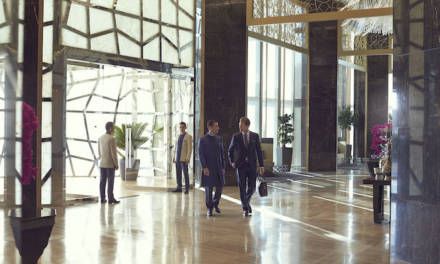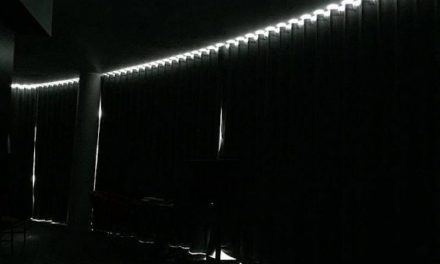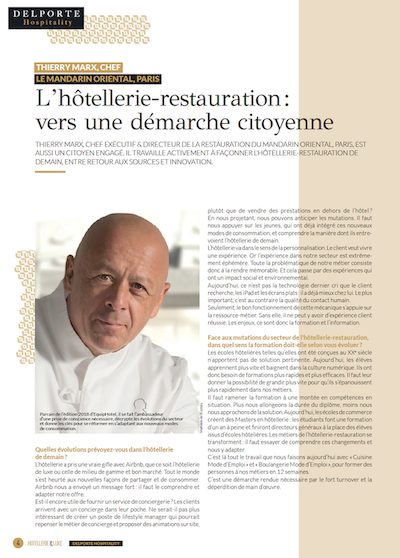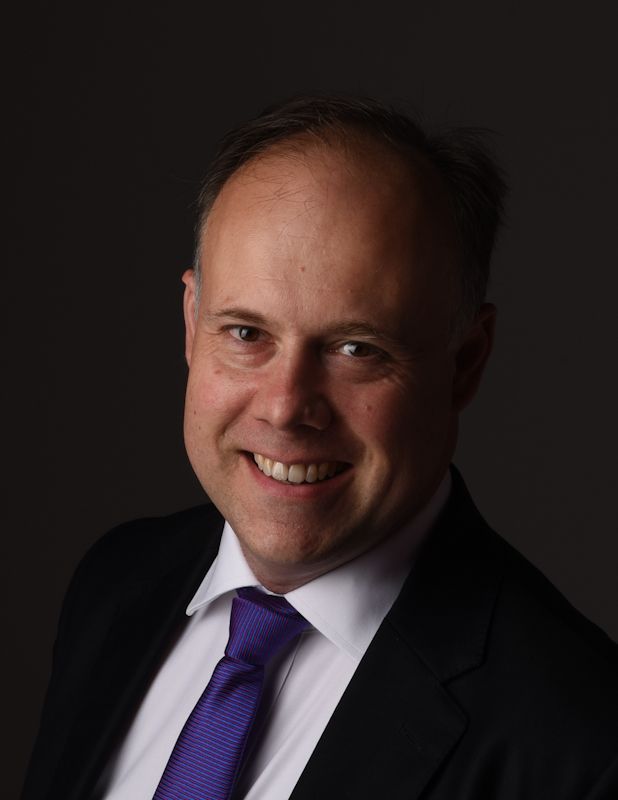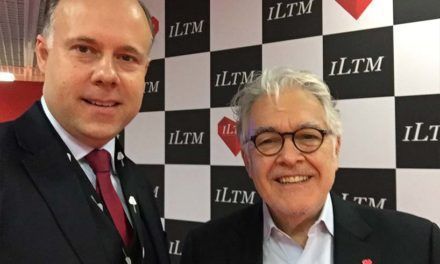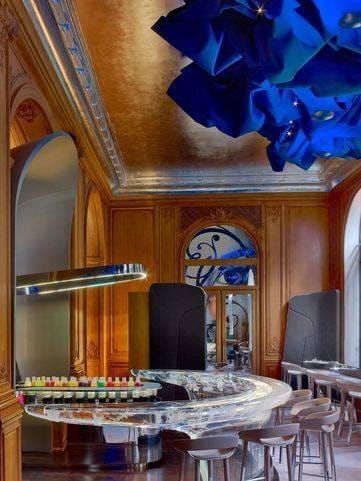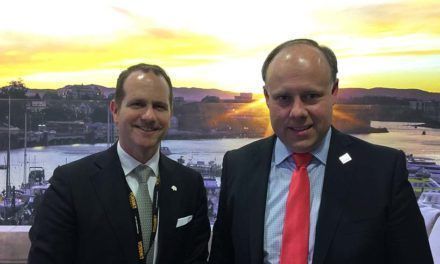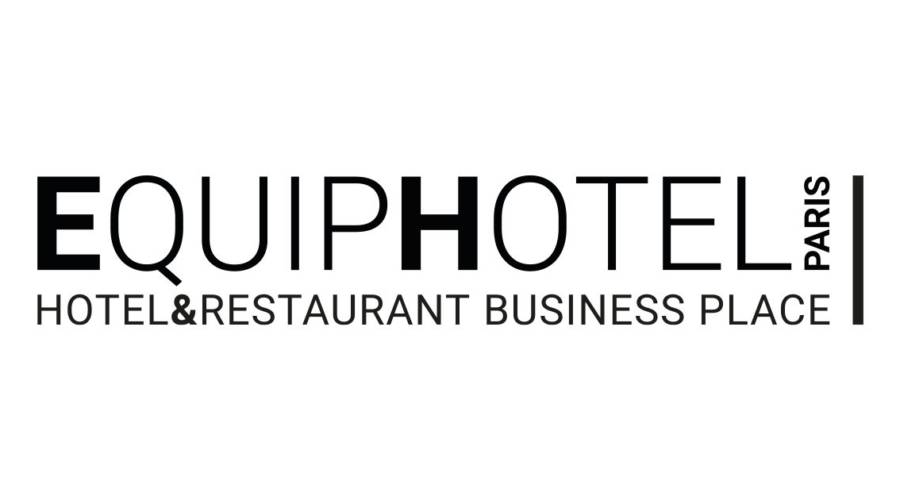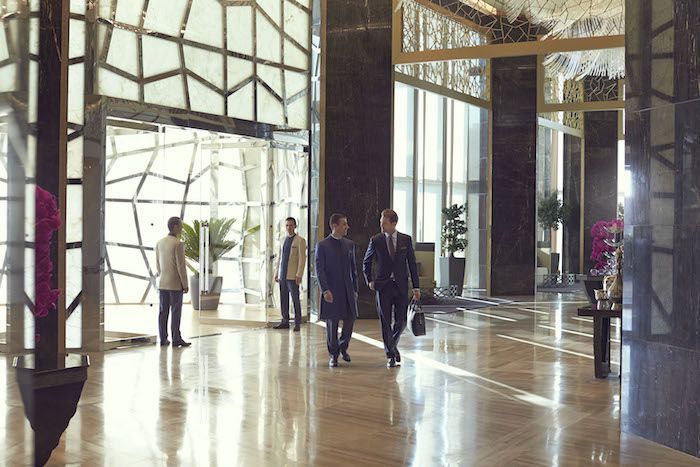Thierry Marx, Chief Executive & Restaurant Director of the Mandarin Oriental, Paris, is also an involved member of his community. He actively works on shaping the future of restaurant dining, going between a return to the basics and innovation.
As sponsor of the 2018 edition of EquipHotel, he serves as the ambassador to a necessary wakeup call in the hotel world, decodes the changes in the sector and provides the keys to reshaping and adapting to new modes of consumption.
“The hotelier and the restaurant professional must be engaged members of the community.”
What evolutions do you foresee in the hotels of the future?
The hospitality sector took a big blow with Airbnb, whether we’re talking about luxury, mid-range or low-cost hotels. Everyone has been affected by the new ways of sharing and consuming. Airbnb sent us a strong message: we have to understand and adapt our services.
Is it still useful these days to provide a concierge service? Clients arrive with a concierge in their pocket. Would it not be more interesting to create a lifestyle manager role that could rethink the concierge profession and offer events or experiences on site rather than sell services outside the hotel?
By projecting forward, we can anticipate the transformations to come. We have to learn to rely on young people, who have already integrated these new consumption styles, and understand the ways in which they foresee the hotels of the future.
Hotels are going toward the direction of personalization. Clients want to live out an experience. Yet the experience in our sector is extremely ephemeral. The core challenge of our profession thus consists of rendering the experience memorable. And this will only occur through experiences that have a social and environmental impact social.
Today, it’s not cutting-edge technology that clients are necessarily after, with all the iPads and flat screens: he already has better things at home. The most important thing, in fact, is the quality of the human contact.
The entire profession depends on this. Without this, there cannot be a successful client experience. The challenge thus lies in training and information.
A new approach to training: speed and efficiency.
Hotel schools as they were created in the 20th century no longer deliver relevant solutions. Today, students learn more quickly and have grown up among a digital culture. They thus need quicker and more efficient training systems. It’s important to give them the possibility to grow more quickly so that they can flourish more rapidly in their careers.
We have to catch the training programs up to speed with the current situation. The longer we prolong the length of a program, the less we arrive at the solution. Today, business schools have created masters in hospitality: students undergo scarcely a 1-year training and end up general managers over students who have come out of hotel schools. The hotel and dining professions are transforming: it is important to try and understand the changes and adapt to them.
This is the very work we’re addressing these days with “Cuisine Mode d’Emploi” and “Boulangerie Mode d’Emploi”, so that we can train the people in these professions in 12 weeks.
It’s an approach that has become necessary due to the strong turnover and the gradual loss of manual labor.
How do you give meaning to your employees in order to motivate them?
One word: “plan”. I ask only one question to my staff: “Where do you see yourself in 2 years?” The rest does not interest me. They help me reach my objectives, and I help them build their professional project. It’s a relationship built on trust. With employees, the relationship goes beyond simply a salary. A salary is simply what we pay for a career solution, but we have to evolve it. Otherwise, it leads to frustrations.
Hoteliers and restaurant professionals have a social responsibility.
At the Mandarin Oriental and in my training schools, I have created a theater school in English so that employees of mine who have not had the chance to learn the language can start to do so.
Hoteliers must understand that we are the ones who will create the ressource-métier.
It is high time for an environmental wakeup call. More and more chefs are growing their own farms. Is this the approach that you subscribe to, especially with your commitment to High Environmental Quality or HQE™ (Haute qualité environnementale) ?
I have referenced 350 hectares of organic agriculture between Chartres and Orléans. I work with partners who have not just an environmental, but also a social impact.
It is important to distinguish between community engagement and marketing tricks. Putting a garden on a roof of a hotel does not make a hotelier an engaged member of his community. 10 tomato plants on the roof is nothing in a grand production scheme. You have to make use of the garden by, for instance, making it a pedagogical garden.
In today’s world, the hotelier and the restaurant professional must be engaged members of the community. The social and environmental impacts play a part in the client experience.
Laurent Delporte, an editor and conference speaker, is a strategic expert in the sector of hotels. A visionary, he brings his unique look on hotels in service to the decision-makers in the industry, whether to enhance the development of new projects or strategic visions.
Laurent has visited and audited over 350 hotels across the world and also participates in mystery visits to provide quality control for the world’s finest hotels.


 HOME
HOME